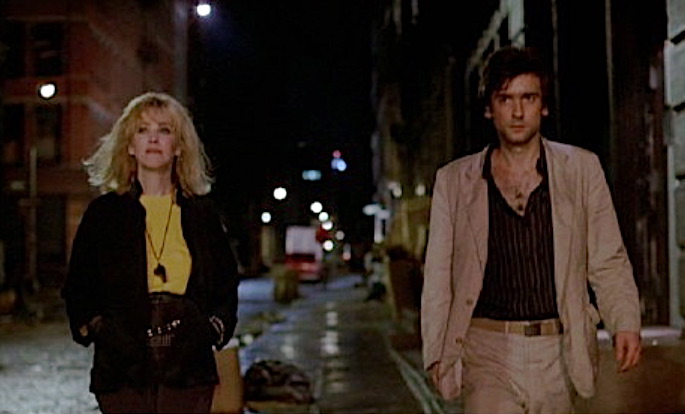Martin Scorsese’s “After Hours” is a comedy, according to the strict definition of that word: It ends hapily, and there are indications along the way that we’re not supposed to take it seriously. It is, however, the tensest comedy I can remember, building its nightmare situation step by insidious step until our laughter is hollow, or defensive. This is the work of a master filmmaker who controls his effects so skillfully that I was drained by this film – so emotionally depleted that there was a moment, two-thirds of the way through, when I wondered if maybe I should leave the theater and gather my thoughts and come back later for the rest of the “comedy.”
The movie tells the story of a night in the life of Paul Hackett (Griffin Dunne), a midtown Manhattan word-processing specialist who hates his job and his lonely private life. One night in a restaurant he strikes up a conversation with a winsome young woman (Rosanna Arquette). They seem to share some of the same interests. He gets her telephone number. He calls her, she suggest he come downtown to her apartment in SoHo, and that is the begining of his Kafkesque adventure.
The streets of SoHo are dark and deserted. Clouds of steam escape from the pavement, as they did in Scorsese’s “Taxi Driver,” suggesting that Hades lurks just below the field of vision. The young woman is staying for a few days in the apartment of a friend (Linda Fiorentino), who makes bizarre sculptures, has kinky sexual tastes, and talks in a strange, veiled way about being burned. In Arquette’s bedroom, Dunne makes the usual small talk of a first date, and she gushes that she’s sure they will have a great time, but then everything begins to fall apart.
At first, we think perhaps Dunne is the victim of random bad luck, as he is confronted with nightmares both tragic and trivial: ominous strangers, escalating subway fares, a shocking suicide, sadomasochistic sexual practices, a punk nightclub where he almost has his head shaved, a street mob that thinks he is a thief. Only later, much later, on this seemingly endless night, do we find how everything is connected – and even then, it doesn’t make any logical sense. For Paul Hackett, as for the Job of the Old Testament, the plague of bad luck seems generated by some unexplained divine wrath.
And yet Scorsese has not simply made a horror movie, or some kind of allegory of doom. Each of his characters is drawn sharply, given quirky dialogue, allowed to be offbeat and funny. Teri Garr has a scene as a waitress who has tried to make sense of New York for so long that it has driven her around the bend. Fiorentino has a dry, sardonic angle on things. Arquette speaks wonderingly of a lover who was so obsessed by “The Wizard of Oz” that he always called her Dorothy in bed. John Heard is a bartender who has seen everything walk in through the doors of his all-night saloon, and has lost the capacity for astonishment.
“After Hours” is another chapter in Scorsese’s continuing examination of Manhattan as a state of mind; if he hadn’t already used the title “New York, New York,” he could have used it this time. The movie earns its place on the list with his great films: “Mean Streets,” “Taxi Driver” and “Raging Bull.”
For New Yorkers, parts of the film will no doubt play as a documentary. In what other city is everyday life such an unremitting challenge? Take, for example, the mob that forms after it believes that Dunne is a thief. Would neighbors form a posse in many other cities? I imagine not; in most cities, theft is still a sort of individual thing, and does not happen so habitually that whole neighborhoods weary of being ripped off. Audiences from other parts of the country are likely to think some of Scorsese’s scenes are fantasy, while New Yorkers may see them as merely exaggerations of reality.
“After Hours” is a brilliant film, one of the year’s best. It is also a most curious film. It comes after Scorsese’s “The King of Comedy,” a film I thought was fascinating but unsuccessful, and continues Scorsese’s attempt to combine comedy and satire with unrelenting pressure and a sense of all-pervading paranoia. This time he succeeds. The result is a film that is so original, so particular, that we are uncertain from moment to moment exactly how to respond to it. The style of the film creates, in us, the same feeling that the events in the film create in the hero. Interesting.
Rosanna Arquette begins a weird night for Griffin Dunne in “After Hours.”




















